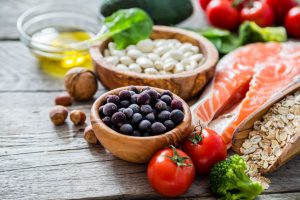At MaxLiving, we teach integrative medicine, which is a practice altogether different from mainstream medicine in one important way. That is, instead of just managing symptoms – which is the focus of the mainstream – integrative medicine emphasizes holistic health and the body’s natural healing power, and aims to help correct the main causes of disease. [1]
5 Essentials: An Integrative Medicine Approach
We group our recommendations into the 5 Essentials®, which consist of chiropractic care, nutrition, mindset, exercise, and minimizing toxin exposure. These essentials are extremely powerful because they center on simple lifestyle choices that help prevent illness and improve the main components of superior health. [2] In this article, we will review the 5 Essentials® so you can reflect on how well you integrated these important health factors in 2020 and set yourself up to exceed your goals in 2021.
Chiropractic Care
 There are several reasons people go to chiropractors. These range from back, neck, and joint pain that can limit mobility, to headaches that can drain your ability to focus on work or family commitments. Any of these issues, and more, are reasons to visit a chiropractor. [3] Additionally, as a preventive measure to keep your spine in top shape, we also recommend at least one annual visit to see your chiropractor.
There are several reasons people go to chiropractors. These range from back, neck, and joint pain that can limit mobility, to headaches that can drain your ability to focus on work or family commitments. Any of these issues, and more, are reasons to visit a chiropractor. [3] Additionally, as a preventive measure to keep your spine in top shape, we also recommend at least one annual visit to see your chiropractor.
Take stock of your chiropractic care for 2020 by asking yourself the following.
- Did you receive an assessment through X Rays or consultation to evaluate the health of your spine?
- Did you follow up with sessions or adjustments?
- Have you scheduled a visit for 2021 with your chiropractor?
Nutrition
 Learning how different foods affect how you look, feel, and perform plays a vital role in living a lifestyle that optimizes health long term. The best way to evaluate the quality of your nutrition plan is to keep a food diary that also notes how you look, feel, and perform based on the foods you’re eating.
Learning how different foods affect how you look, feel, and perform plays a vital role in living a lifestyle that optimizes health long term. The best way to evaluate the quality of your nutrition plan is to keep a food diary that also notes how you look, feel, and perform based on the foods you’re eating.
The following list outlines the basics of a healthy diet and will help you evaluate your nutrition plan during 2020 and help guide you to make better choices in 2021.
1. Does your diet include healthy fats and minimize damaged fats?
- Healthy fats include:
- Omega-3’s either through supplementation or in foods such as salmon, flaxseed, and walnuts
- Fats that occur naturally in food such as nuts, seeds, avocados, eggs, olives, and coconut
- Damaged fats include:
- All hydrogenated oils and added trans fats
- Pasteurized dairy products – this includes cheese and ice cream made from pasteurized milk [4]
2. Does your diet include animal proteins raised without growth hormones, antibiotics, corn feed, or animal by-products?
These cleaner sources of animal proteins provide all the essential amino acids, higher levels of healthy fats, and are free of growth hormones or antibiotics that may cause metabolic dysfunction in humans.
When shopping for animal proteins, here are some key terms to look for:
- Grass-fed (little to no corn or corn by-products)
- Range free (animals not stuck in cages)
- Hormone/antibiotic-free
- Organic (pesticide-free feed). [5] [6]
3. What type of carbohydrates are you eating?
While several diet plans like keto, paleo, and low carb call for a reduction in carbohydrate intake, there is still a place for ingesting some high-quality carbs in your diet. By focusing on fruits and vegetables over refined grains and sugars as your primary carb sources, you’ll be gaining a ton of health benefits including:
- Increased fiber intake, which supports healthy blood sugar levels, digestive health, and proper elimination of toxins
- Fruits and vegetables provide nature’s front line defense against oxidative stress by delivering high levels of antioxidants, which reduce damage to all components of the cell, including proteins, fats, and DNA [7]
Mindset
Start 2021 With a Fresh Mindset and Perspective
 Doing an honest evaluation of your mindset for the last year will go far towards your ability to set attainable goals for 2021. For most, 2020 put a tremendous strain on their mental outlook and likely greatly influenced their ability to adhere to a healthy lifestyle. On the other hand, the challenges brought about in 2020 are the type that can forge an even stronger mindset. Here are some key points to reflect on:
Doing an honest evaluation of your mindset for the last year will go far towards your ability to set attainable goals for 2021. For most, 2020 put a tremendous strain on their mental outlook and likely greatly influenced their ability to adhere to a healthy lifestyle. On the other hand, the challenges brought about in 2020 are the type that can forge an even stronger mindset. Here are some key points to reflect on:
- Were you able to keep your health as a top priority last year?
- How well did you keep up with relationships with family and friends?
- Were your sleep habits healthy, or did they leave you stressed for time, anxious, or lethargic?
- Given the above, what would you change this year to make a healthy lifestyle more impactful?
Exercise
Stick to Your New Year Goals
 Regular exercise helps build lean muscle, reduce body fat, and support brain health. [8] Regular readers of MaxLiving realize that many of our cutting-edge exercise programs facilitate optimal fitness in minimal time, building your performance, and increasing your body’s ability to fight stress, anxiety, and illnesses. Looking back on 2020:
Regular exercise helps build lean muscle, reduce body fat, and support brain health. [8] Regular readers of MaxLiving realize that many of our cutting-edge exercise programs facilitate optimal fitness in minimal time, building your performance, and increasing your body’s ability to fight stress, anxiety, and illnesses. Looking back on 2020:
- Were you able to maintain a regular exercise program?
- Did you improve, maintain or miss your exercise goals?
- Did you have time for exercise or was it difficult to find time to maintain a program?
- What will you change this year to make exercise more productive?
Minimizing Toxin Exposure
Reduce Your Exposure to Common Everyday Toxins
 Minimizing exposure and removing toxins from your body helps return your body’s natural balance and allows it to perform at its highest potential. [9] The key is to make lifestyle choices to reduce the toxins entering your system.
Minimizing exposure and removing toxins from your body helps return your body’s natural balance and allows it to perform at its highest potential. [9] The key is to make lifestyle choices to reduce the toxins entering your system.
Here are some common toxins to look out for and how the can impact your health:
- Plastics – Ingesting plastics can damage hormone receptors, affect sex drive, cause fatigue, and lead to illness and diseases. [10] Ways to reduce exposure are:
- Avoid PVC and Styrene products
- Choose glass containers to store food
- Avoid polycarbonate drinking bottles with Bisphenol A
- Don’t heat food in plastic containers [11]
- Environmental Toxins – Environmental endocrine disruptors (EEDs) are toxins that imitate hormones. By blocking or altering hormone functions, they may contribute to an increase in hormone-related cancers, such as those of the breasts, testicles, and prostate. Ways to reduce exposure are:
- Wash your hands frequently, avoiding antibacterial soap
- Avoid artificially fragranced products
- Choose organic food products when possible [12]
Grading 2020 and Areas For Improvement In 2021
So how well did you do? To give yourself a score on the 5 Essentials® go back to each section and ask yourself the following:
- On a scale of 1-3 how well do I understand the health value of this lifestyle component?
- 1=poorly
- 2=good
- 3=very well
- On a scale of 1-3 how well do I adhere to this lifestyle component?
- Same scale as above
- How can I improve on this lifestyle component in 2021?
- Example, I can reduce toxin exposure by:
- not heating food in plastic containers
- choosing more organic foods when grocery shopping
- Example, I can improve my nutrition by:
- Using a food diary
- Eating more nuts, seeds avocados, eggs, olives, and coconut, instead of packaged snacks
- Example, I can reduce toxin exposure by:
By gauging where you are starting in your health journey, you can make realistic health goals this year that implement the 5 Essentials ® and help you achieve wellness like never before!
References
- https://www.patronusmedical.com/blog/functional-medicine-vs-integrative-medicine
- https://maxliving.com/five-essentials/
- https://maxliving.com/healthy-articles/the-science-of-chiropractic/
- https://www.healthline.com/nutrition/10-super-healthy-high-fat-foods
- https://www.healthline.com/nutrition/10-reasons-to-eat-more-protein
- https://www.healthline.com/nutrition/7-food-toxins-that-are-concerning
- https://www.healthline.com/nutrition/good-carbs-bad-carbs
- https://www.healthline.com/nutrition/10-benefits-of-exercise
- https://www.healthline.com/nutrition/detox-diets-101
- https://www.healthline.com/nutrition/what-is-bpa
- https://www.theguardian.com/us-news/2019/may/22/toxic-chemicals-everyday-items-us-pesticides-bpa
- https://www.ncbi.nlm.nih.gov/pmc/articles/PMC2966478/


